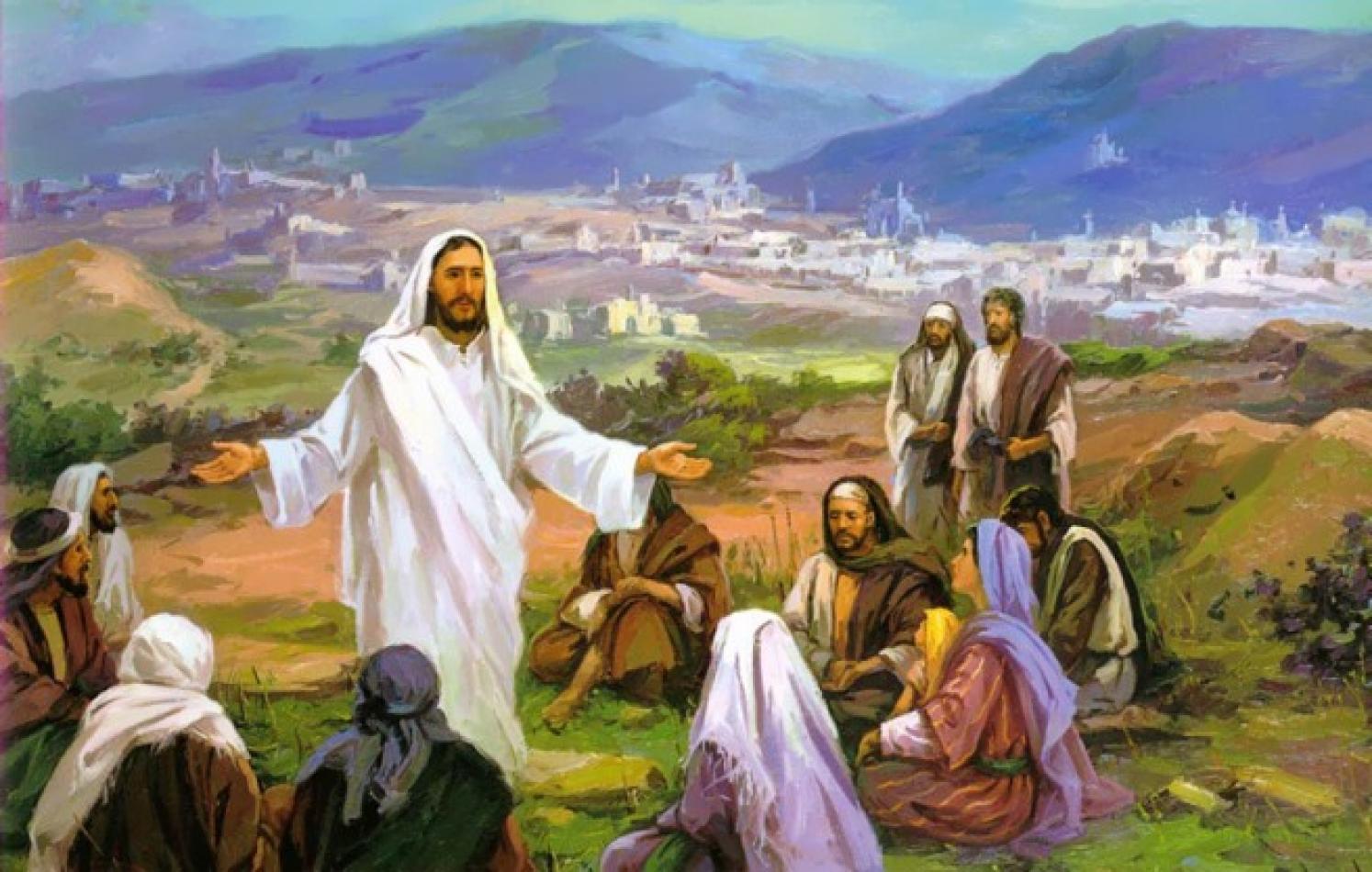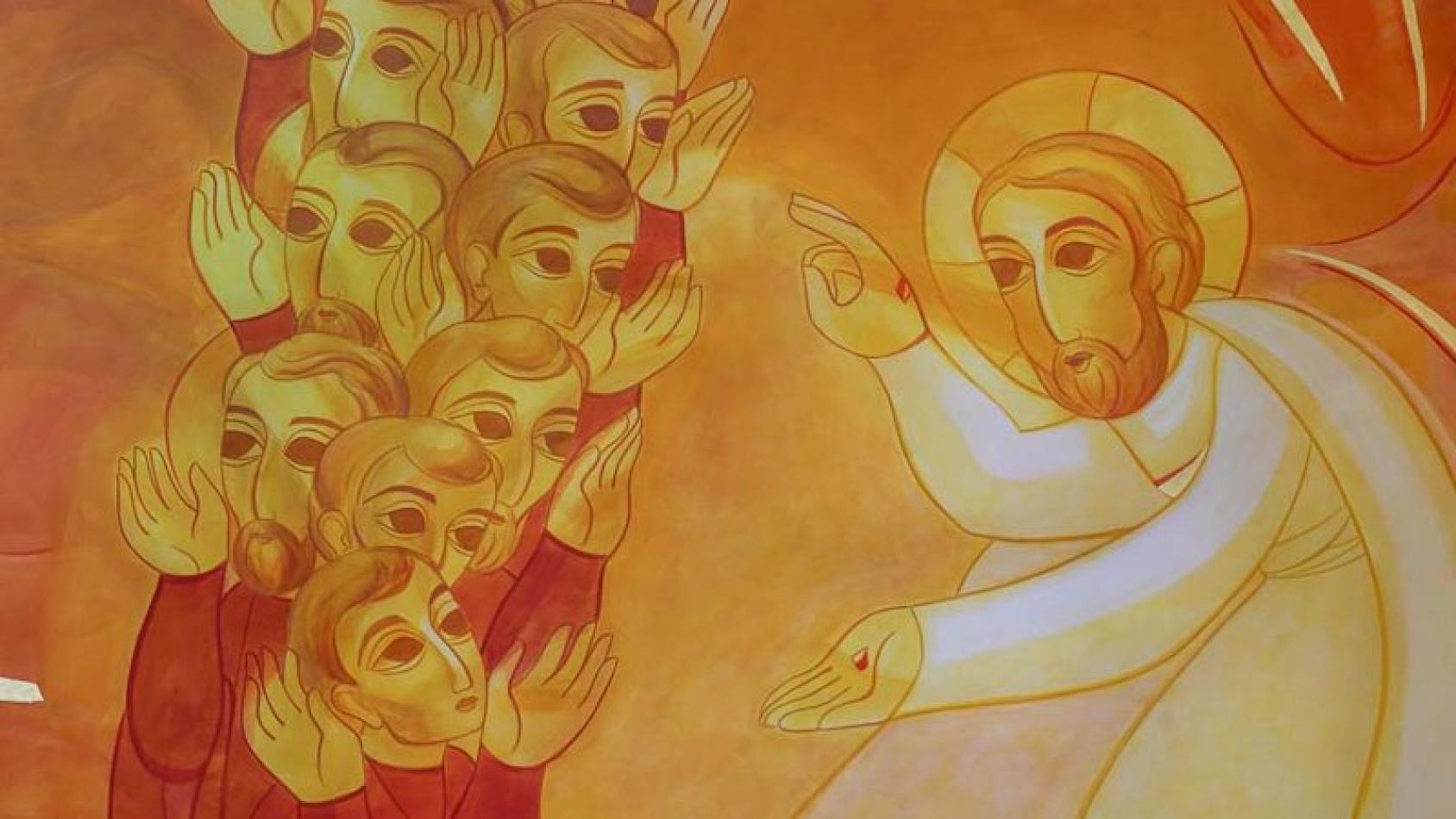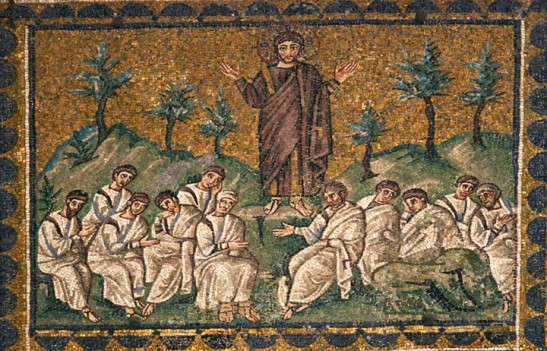Daniel Comboni
Comboni Missionaries
Institutional area
Other links
Newsletter
The Jews call the first five books of the Bible the Law. A surprising way to call a collection that contains rules, precepts, and commands, but this is not a code of law as we know it today. It is an exciting story, a love story between Israel and her God. It begins with the creation of the world and continues with the call of Abraham, the stories of the patriarchs, the slavery in Egypt and the Exodus. A truly original Law!
Matthew 5:17-37
They Keep the Commandments But Do Not Enter the Kingdom of Heaven
Introduction
The Jews call the first five books of the Bible the Law. A surprising way to call a collection that contains rules, precepts, and commands, but this is not a code of law as we know it today. It is an exciting story, a love story between Israel and her God. It begins with the creation of the world and continues with the call of Abraham, the stories of the patriarchs, the slavery in Egypt and the Exodus. A truly original Law!
In truth, the term “Law” does not translate exactly the Hebrew word “Torah” that is derived from the root word iarah. It indicates the act of shooting an arrow to show the direction. Even on the roads, we orient ourselves by following “arrows,” signage.
The Torah traces the path that leads to life. It does not dictate cold, rigid, impersonal norms. It tells what happened to a people, Israel, the bride being sometimes faithful, more often than not unfaithful to her Lord. With its joys and misadventures, successes and failures, feasts and grief, it reflects each person’s story: the dangers to be avoided and the wise decisions to make.
The Torah revealed to Moses on Mount Sinai, however, was not the final Word of God. On the Mount of the Beatitudes, Jesus has recognized its validity, but, considering only one phase, he indicated a new goal, a more distant and boundless horizon: the perfection of the Father who is in heaven.
The one who does not practice the new justice, vastly superior to that of the scribes and Pharisees, stops halfway and does not enter into the Kingdom of God.
Gospel: Matthew 5:17-37
“We are fortunate, O Israel, for we know what pleases the Lord!” (Bar 4:4). Thus Baruch expressed the pride of his people and his gratitude to the Lord who had taught Israel the “ways of Wisdom” (Bar 3:27), in the Torah, in the “book of the commands of God” (Bar 4:1).
As a work of God, the Torah cannot be refuted or contradicted. “The Scripture is always true”—said Jesus (Jn 10:35). God cannot have second thoughts or deny what he has said in the past or make corrections. The path he has traced from the Old Testament has an everlasting validity.
In the first phase of today’s Gospel, Jesus reiterates this truth: “Do not think that I have come to annul the Law and the Prophets. I have not come to annul them but to fulfill them” (v. 17).
If he feels the need to clarify his position, it means that someone has had the impression that he, with his behavior and his own words, is demolishing the same beliefs, expectations, and hopes of Israel, based on sacred texts.
Jesus was respectful of the laws and institutions of his people. However, he interpreted it in an original way. His point of reference was not the letter of the precept, but the good of the person. For the love of persons, he did not hesitate to break even the Sabbath. His freedom aroused astonishment, perplexity, and irritation even of the religious authorities. However, more than his failure to comply with the requirements of the rabbis, what created confusion was his message, the new Torah. He had proclaimed on the mountain a Torah that upsets the principles and values on which the religious and civil institution of Israel was based.
Moses had promised: “All the nations of the earth shall fear you: The Lord will fill you with all kinds of good things; he will put you at the head of the nations and not at the tail” (Dt 28:10-13). How could Jesus claim to be in harmony with the Old Testament when he proclaimed blessed the poor, the persecuted, the oppressed and announced to his followers, difficulty, sufferings, and persecutions? His message was in sharp contrast with the Scriptures.
Reading the prophets, Israel was convinced that the Messiah would establish an everlasting, glorious kingdom. He would give “to the afflicted of Zion a crown of glory instead of ashes” while for the enemies would enact a “day of vengeance of our God” (Is 61:2-3). In the most dramatic moments in its history, Israel found in these promises the reason to continue to believe and hope in a better future. Why did Jesus delude these expectations?
Here’s how he clarifies his position and choices: the promises made by God will all come true, not even one of them will fall. Before the world ends, when what was written will be fulfilled, but in an unexpected way. The surprise will be so great that even the pious, devout, sincere people, like John the Baptist, will run the risk of seeing their faith waver and remain shocked (Mt 11:6).
The saying of Jesus must be understood in this light. They conclude the first part of today’s Gospel concerning the observance of even the minimal precepts and justice, which is superior to that of the scribes and Pharisees (vv. 19-20). The statutes referred to are not the ones of the old law, but the Beatitudes. These Beatitudes are the new proposal, the new justice that leads to fulfillment and brings to perfection the old one, that which the scribes and Pharisees practiced admittedly in an exemplary manner.
As in the practice of the old law, there were those who were satisfied with fidelity to the most important precepts and neglected the others. To comply with the proposal of the Beatitudes there are those who adhere to the minimum (admire, approve, support those who have the courage to do them). There are also those who are completely consistent and make courageous and firm decisions. In the eyes of God—Jesus declares, with some humor—the first ones will appear as “the least,” the others will be judged great and will be considered “rabbis” in the kingdom of heaven. They will be people held up as models to other disciples.
In the second part of the Gospel (vv. 20-37), four examples are presented of the leap forward, required of all those who want to enter the kingdom of heaven. These are four provisions that are found in the Old Testament and which are not refuted but explained in an original way. Jesus highlights all the implications. He starts from the Torah of Moses—the point of arrival, the summit reached by the “righteousness” of the scribes and Pharisees—and goes beyond, offers the ultimate goal of this Law.
The Gospel puts forward six examples, but today’s reading takes only four. The other two will be dealt with next Sunday. They are all introduced with the same stereotyped formula: “You have heard that God has said to the ancestors … now I tell you …”
Do not kill! (vv. 21-26)
It’s the first case taken into account. It’s a clear provision that admits no exceptions. It condemns any form of murder (Gen 9:5-6). A person has no power over the lives of others, even if the other were a criminal (Gen 4:15). Human life is sacred and inviolable from the moment it blooms until, of course, it ends. This was already clear in the ancient Torah, but to enter into the kingdom of heaven, it is necessary to understand that not to kill involves much more. There are other subtle, sophisticated, covert and disguised ways to kill.
If there were X-rays capable of detecting the cemetery hidden in our hearts we would be startled. Among the dead, we would find those to whom we have sworn not to speak to, those to whom we have denied forgiveness, those we have continued to accuse of mistakes done, those whose good name we have destroyed by gossips or slanders, those whom we have deprived of love and the joy of living.
Jesus teaches that the commandment that orders not to kill has so many implications that go well beyond the physical assault. One who uses offensive words, gets angry, nourishes sentiments of hatred has already killed one’s brother/sister (v. 22).
The murder always starts from the heart. One cannot hate a person and continues to feel at peace with oneself. One cannot kill if he is not convinced of having to deal with one who is not human who does not deserve to live and must be eliminated. This smearing work is carried out with the words, repeating to oneself, as a ruthless refrain: “He is a fool,” “he is crazy,” “he is Godless.” So one arrives, without remorse, to pronounce the sentence: he deserves “the stake.”
And this is an unjust and cruel heart—Jesus teaches—that must be disarmed. To the demonizing work of a human being, he pits against his judgment: he is a brother. Three times he repeats this word (vv. 22-24), as an antidote to heal the heart from the poison of hatred, kept alive and increased by bad words. Then he addresses the root of the conflict; he introduces the theme of reconciliation.
It appeals, first of all, to its need and importance (vv. 23-24).
The cue is taken from a religious practice of Israel. Before entering the temple to offer sacrifices, it was necessary to undergo the painstaking purifications. Jesus declares that it is not the body that needs to be pure, but the heart. Reconciliation with the brother/sister replaces all the rites of purification.
The rabbis taught that the most important Jewish prayer—Shema Israel—once started, could no longer be interrupted for any reason, even if a snake twisted itself around the leg of the praying person. Jesus says that in order to reconcile with the brother/sister, one even has to stop in the middle, not only of the Shema Israel but even the offering of sacrifice in the temple.
It is hard to find in the Jewish culture a more effective image to emphasize the importance of reconciliation. The one who rejects it, who does not seek it at any cost excludes oneself from the “kingdom of heaven.”
The early Christians had assimilated well this lesson. The author of the Letter to the Ephesians recommended: “Do not let your anger last until the end of the day” (Eph 4:26). A few years before, in the young community of Antioch in Syria, this provision had been issued: “In the day of the Lord, who is at odds with his neighbor cannot join you until they have reconciled so that your sacrifice may not be defiled (Didache 14:1-2). Two centuries later, a bishop of the same region exhorted his brothers in these words: “Pronounce your judgments on Monday so that, having time till Saturday, you may resolve the disagreement (between the members of your community) and for Sunday to reconcile those who are at odds with each other” (Didascalia 2, 59, 2).
After recalling the need of reconciliation, Jesus emphasizes its urgency (vv. 25-26). It cannot be deferred.
A Christian should never resort to the courts for justice. He should always be able to agree first with his brother. However, if he prefers to litigate rather than endure injustice, let him keep in mind that if he presents himself to God in disagreement with his brother, God will not recognize him as a son. The harsh images of the prison, the guards, and the obligation to pay the last penny should not materialize. They are typical of Semitic culture and rabbinic language. They are introduced only to call energetically the imperative need of reconciliation. To obtain it the disciple must be willing to renounce anything.
After speaking of the commandment not to kill, Jesus goes to the issue of adultery (vv. 27-30).
The letter of the Torah seemed to prohibit only bad actions. Jesus, as he usually does, instead goes to the heart and captures the deepest requirements of this commandment. There are friendships, feelings, relationships that are already adulterous.
We are in a field where, with much ease, one is overwhelmed by instincts and passions that can cause great woes to oneself, one’s own family and that of others. Jesus insists, in the face of certain situations, on the need to have the courage to proceed with cuts, though painful, before evil desires become adulterous.
There are two members of the body that need to be amputated: the right eye and the right hand. In this context, they are the symbols of that which awakens lust (eyes) and dangerous contacts (hand). It is a must to be ready to renounce all that common opinion considers enriching experiences, rewarding achievements, opportunities not to be missed [the right side was considered the noblest, the favorite (Ps 137:5)], but not to ruin life. This is not bodily mutilation but grueling self-control which Paul speaks about: “I punish my body and control it, lest after preaching to others, I myself should be rejected” (1Cor 9:27).
Gehenna is the valley that borders the south-west of the city of Jerusalem. It was the garbage dump of the city, the cursed place where babies had been sacrificed and burned to the god Moloch. It was believed that there was a door there that leads to the world of demons.
Those who cannot impose on themselves the necessary sacrifices in the field of sexuality run the risk of throwing the whole body (one’s own person) into Gehenna (the garbage). This is not a punishment from God, but the consequence of sin.
The third case concerns divorce (vv. 31-32).
God wanted monogamous and indissoluble marriage. The Bible clearly states, from the first pages: “The two form one flesh” (Gen 2:24). Because of the hardness of the human heart, divorce is introduced also in Israel.
Going against the custom, traditions, and interpretations of the rabbis, Jesus brings marriage to its original purity and excludes the possibility of separating what God has determined to remain united. The clause “except for marital unfaithfulness,” which seems to leave open a possibility of divorce, actually concerns the illegitimate and irregular unions.
Neither infidelity nor misunderstandings or any other difficulty of the couple can legitimize a new matrimony. Any union of this kind is defined by Jesus as adultery, a stain that cannot be washed by a good confession, but a choice of death.
The disciple should be careful because the current mentality, permissiveness, the trivialization of sexuality, and licentiousness of moral behavior can easily make one forget the words of the Master. It can waver even the most solid beliefs and persuade as normal, humanizing, appreciable that which is instead only a palliative, a makeshift, and an expedient dictated by “the wisdom of this world.”
It’s not loyal, it does not render a good service to one who is in trouble, who conceals the demands of Christian morality, who will obligingly show and propose cohabitations, which tend to be inevitably accompanied by painful inner conflicts. One should always remember that renunciation, sacrifice, the cross and also the heroism of virginity of those who, as Jesus said, “…are eunuchs who have chosen to remain so for the kingdom of heaven” (Mt 19:12).
The clear words of Jesus, however, did not give any disciple license to judge, to condemn, to humiliate, to marginalize those who have failed in their married life. It is about, in general, people who have gone through great suffering and have experienced dramatic situations. For them, the Christian project of marriage reveals itself at a time impossible to fulfill. The community is called to express to them the tenderness and understanding of the Master who did not extinguish a smoldering wick or break the bruised reed (Is 42:3).
The fourth case is that of the oath (vv. 33-37).
During the exile in Babylon, the Israelites had assimilated, among other bad habits, that of swearing inappropriately. They came to the point of not making a statement without accompanying it with some curses. To avoid pronouncing the name of God they resorted to the less demanding formula: they swore by heaven, by the temple, by the earth, by their parents, by their heads. A sage of the second century B.C. recommended: “Do not get used to swearing, taking the name of the Holy One” (Sir 23:9).
Jesus takes a stand against this reckless habit and he does it with his usual radicalism. “Do not swear at all … But let your speech be ‘Yes’ when it is ‘yes’, ‘No’ when it is ‘no’, the rest comes from the evil one” (vv. 33-37).
It was not so much the desecration of the name of the Lord that worried him. There are other elements that make an oath unacceptable. First of all, it assumes a pagan concept of God who is imagined as an avenger, ready to hurl his thunderbolts against liars and perjurers. Then it is a symptom of a society that is dominated by shyness, mistrust, disloyalty, and mutual suspicion.
In the community of the disciples of Jesus, the oath is inconceivable because it is made up of “pure hearted” (Mt 5:8) people, guided by the spirit of truth (Jn 14:17; 16:13). They ban from their life every lie — as recommended by Paul — “give up lying; let all speak the truth to our neighbor for we are members of one another” (Eph 4:25; 1P 2:1).
Fernando Armellini
Italian missionary and biblical scholar
https://sundaycommentaries.wordpress.com





